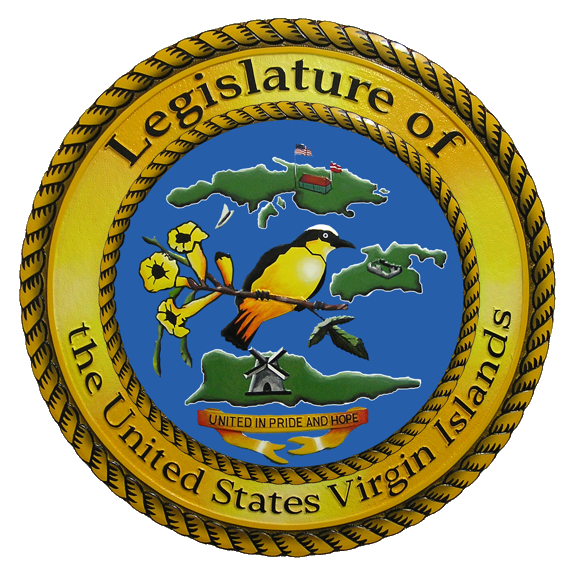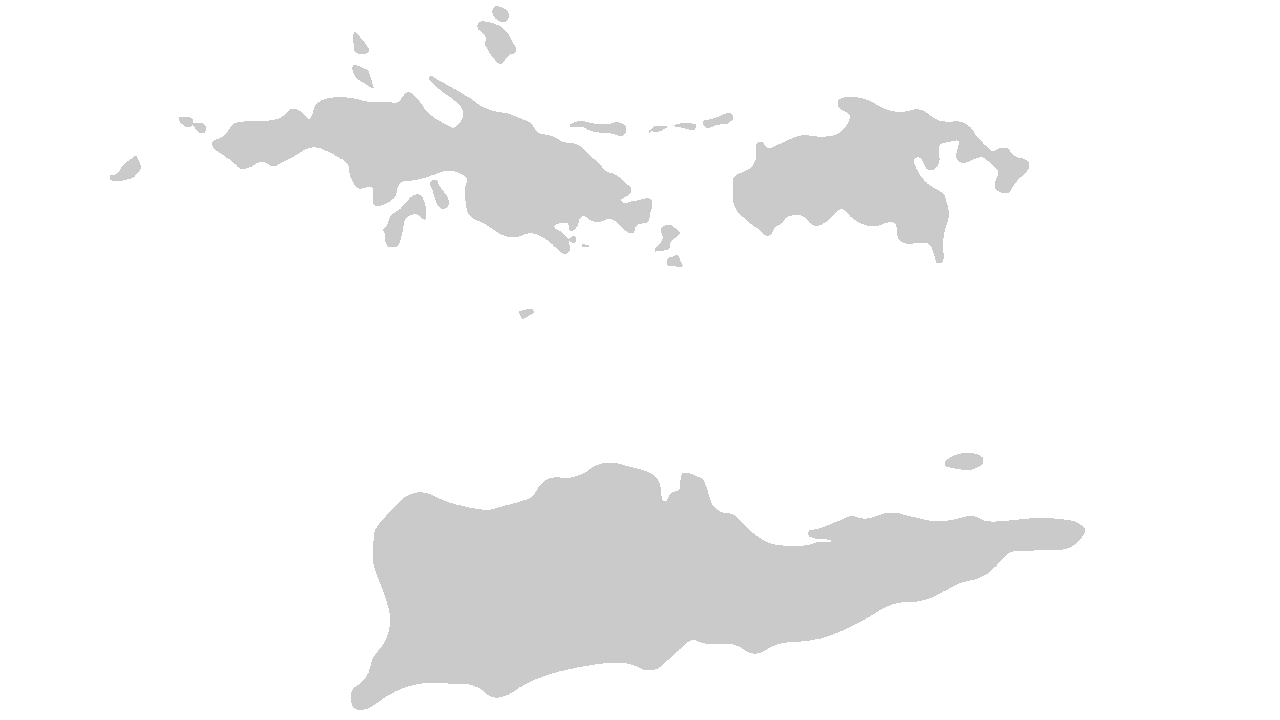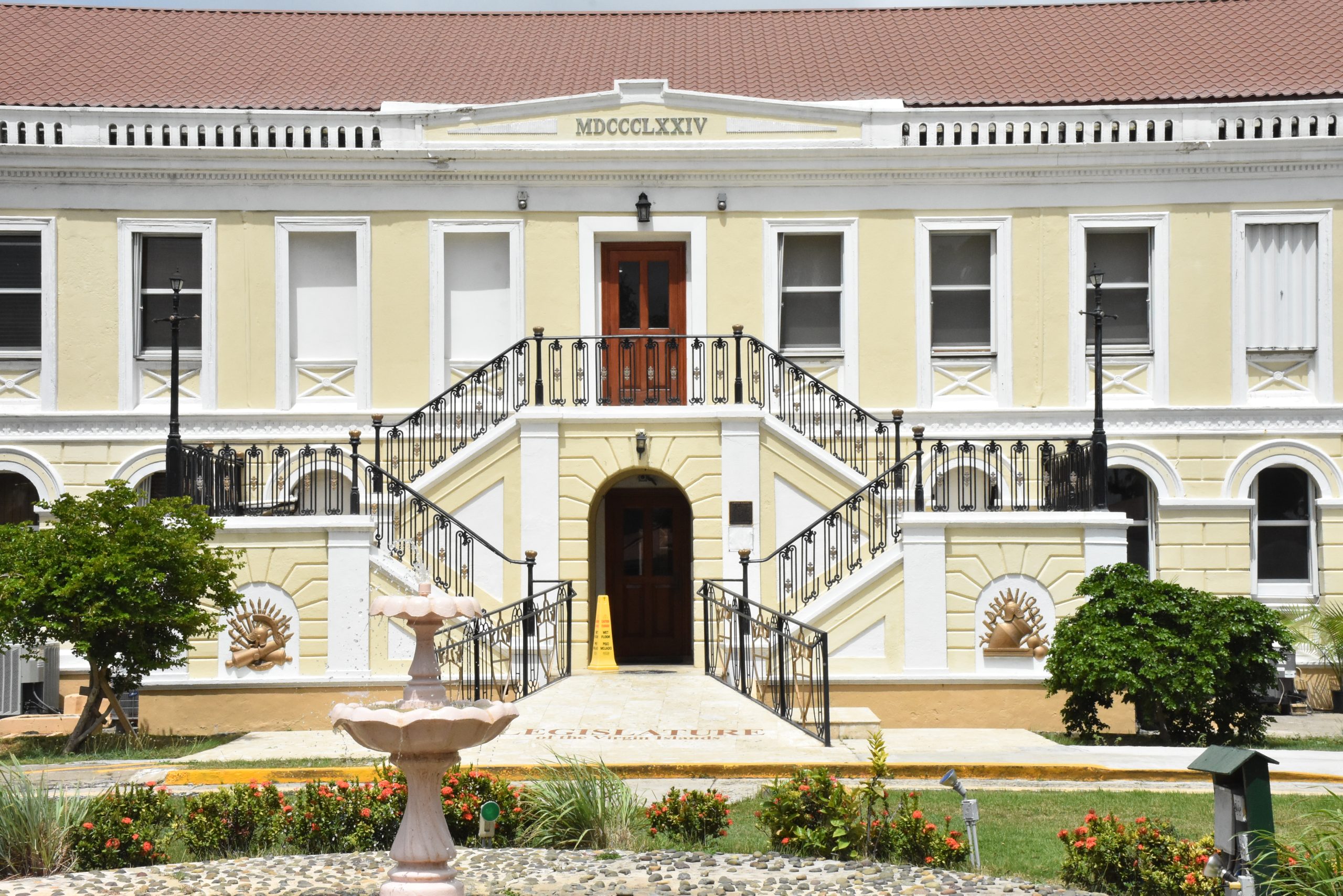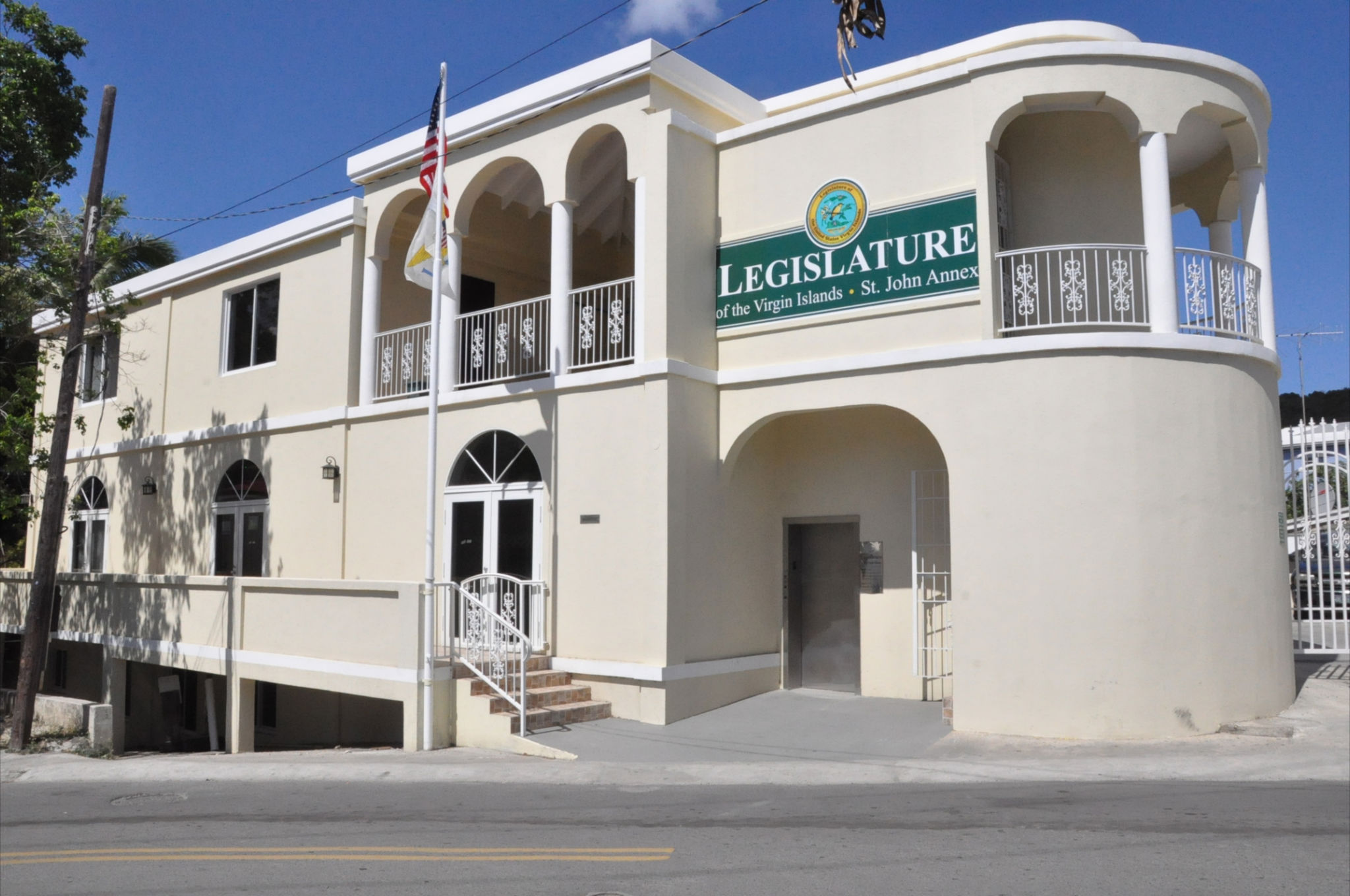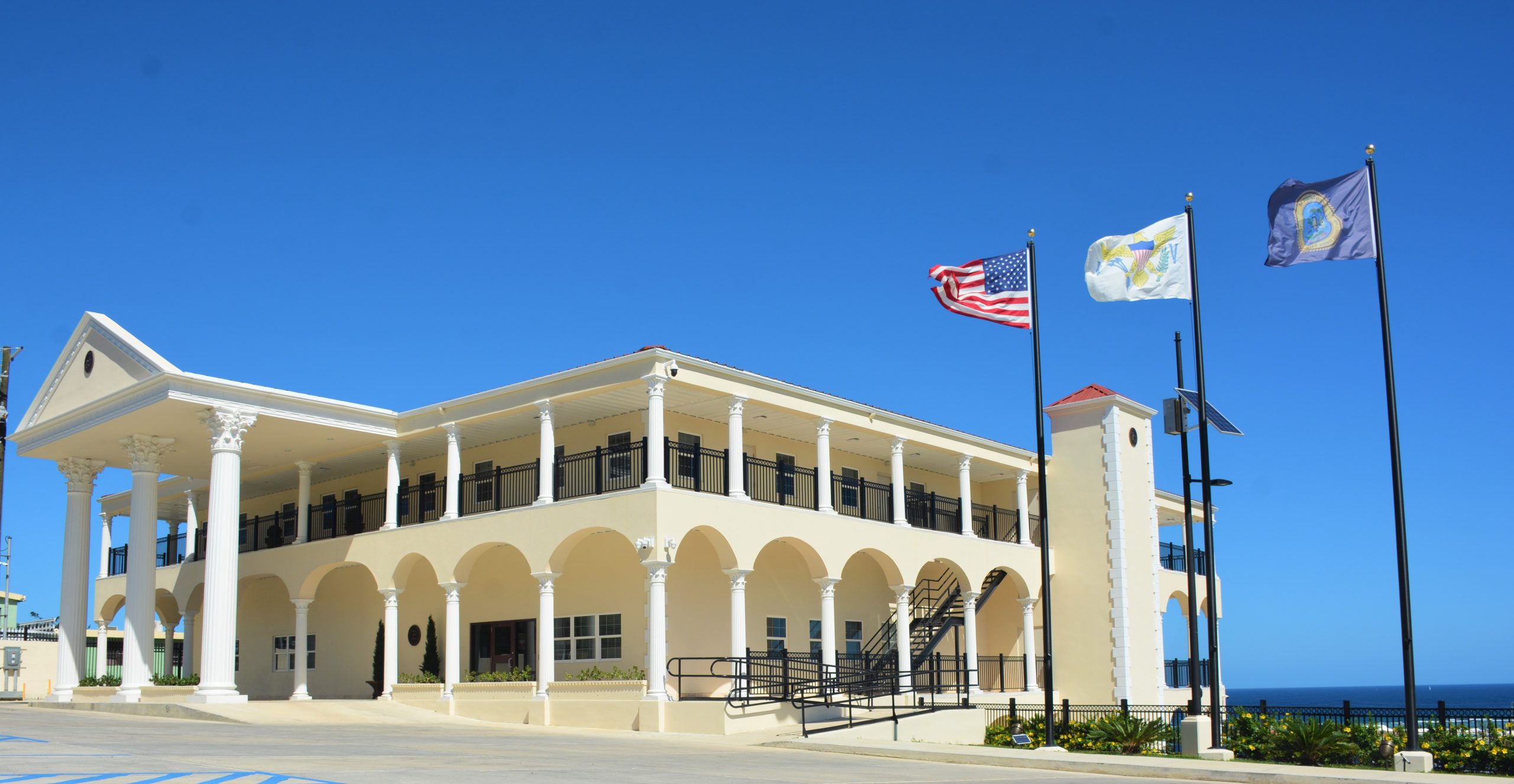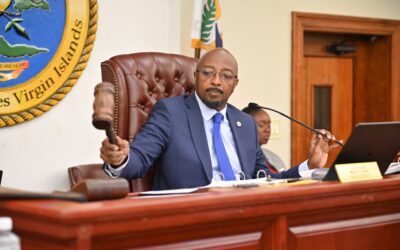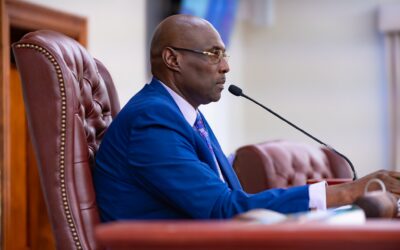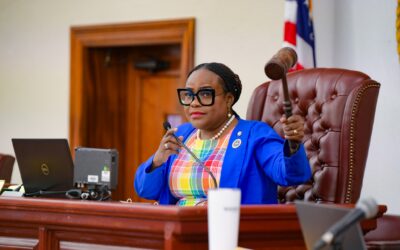ST. CROIX – Members of the Committee on Health, Hospitals, and Human Services led by Senator Novelle E. Francis, Jr. convened in a meeting at the Frits E. Lawaetz Legislative Conference Room. The Committee received an update on matters related to nursing practices in the Virgin Islands, including compensation, working conditions, expired contracts, and the credentialing of traveling nurses. It also considered Bill 34-0244, which expands the practice of naturopathic medicine and Bill 34-0279, which establishes the Virgin Islands Behavioral Health Act. Both bills were forwarded to the Committee on Rules and Judiciary for further consideration.
The Committee received extensive testimony from the Nurse Licensure Board, nurses, and representatives of the nursing unions. Arnelle Commissiong, the Treasurer of the Virgin Islands Board of Nurse Licensure, said the Board had processed over 1,101 temporary permits at the estimated cost of $125,000 during the pandemic. These costs were not reimbursed to the Board. During this time, the Board also processed 800 renewals and 49 endorsements for licensure. Commissiong spoke of the board’s limited staff and resources, which makes it difficult to complete the additional permits.  Prior to entering the territory, any nurse who enters the territory is required to hold a Virgin Islands Nursing Licensure prior to working and must complete a request for license by endorsement. The Virgin Islands Code requires a 90-day turnaround for processing applications. However, the Board strives to complete the applications within a two-week period. The Board also spoke of its efforts to implement the Nurse Licensure Compact, which is estimated to be live by the end of 2023. This is pending the implementation of the Federal Background Check, which is being handled by the Department of Health. This process can take up to 12 months.
Jacqueline Canton, the Executive Chair and Chief Negotiators of the Registered Nurse Leadership Union, testified that hospitals and health facilities in the territory had numerous problems, including structural challenges and other issues regarding mold and other contaminants. However, although efforts had been made to mitigate the issues, it was not enough. Several nurses logged complaints stating that they had upper respiratory symptoms such as runny eyes, runny noses, and intense skin issues. Other nurses have experienced worse symptoms such as asthma, chest discomfort, and headaches. Canton voiced frustration stating that it is challenging to care for others while experiencing these challenges. Canton also voiced frustration at the vaccine mandate that was implemented. Many nurses left due to this decision and stated that this mandate was a violation of their collective bargaining agreement. According to Canton’s testimony, many nurses were required to pay for COVID-19 testing out of pocket, paying $60 a week, to maintain employment.
Dr. Brittany Dawson, the Vice Chair of the Virgin Islands State Nurses Association CBU District 1 for the Juan F. Luis Hospital and Medical Center and the chief negotiating officer for the bedside nursing union contracts also testified. Dr. Dawson said the territory was experiencing a nursing shortage prior to the beginning of the pandemic, consistent with what had been happening globally. Current salaries and benefits for nursing staff have not been competitive. Nurses in the territory have been working in condemned facilities, with little to no support. This has been without additional hazard compensation, lack of supplies, and sometimes without water and air conditioning. Dr. Dawson stated that at times, there is only one nurse present on the shift. Many nurses were forced out and shamed for not being vaccinated. Due to the pandemic, many nursing staff in the territory have left for the mainland for better working conditions and better salaries. Many hospital systems have offered numerous forms of aid, from childcare assistance, and in house laundry service, to reduce the chance of exposure to nurses’ families. Current staffing is estimated at 86 at SRMC, 59 at JFL, DOH with six in St. Croix and five in St. Thomas. Dawson stated that this is incredibly understaffed, stating that over 100 more nurses would need to be hired in the territory.
Testimony was heard considering Bill No. 34-0244 An Act amending Title 27, Virgin Islands Code, Chapter 4, Section 191(a) and (d) to expand and clarify the definition of naturopathic medicine and the physical modalities used in the practice of naturopathy. The measure was sponsored by Senator Genevieve R. Whitaker.
Aziyah Shabazz, an Esthetician and Physical Trainer and Owner of Aziya’s Nature Spa delivered testimony in support of the measure. Shabazz stated that the people of the Virgin Islands have historically turned towards natural means for health maintenance and treatment of acute and chronic conditions. Elders in the Virgin Islands have usually relied on these methods and are often reluctant to seek traditional medical treatment. Guided preventative care as well as acute treatment is seen as a welcome addition to the community. Shabazz defined naturopathic medicine as a distinct health care profession that combines the wisdom of nature with the rigors of modern science. This definition is derived from the AANMC/Association of Accredited Naturopathic Medical Colleges.
Naturopathic doctors are trained as primary care providers who diagnose, treat, and manage patients with acute and chronic conditions, while addressing diseases and dysfunction at the level, body, mind, and spirit. These doctors concentrate on the whole patient’s wellness through health and promotion and disease prevention, while addressing the underlying cause of the patients’ condition. Naturopathic physicians care for all patients of all ages and genders and practice in settings ranging from private clinics to integrative medical centers, urgent care clinics and hospitals. Currently, there are 26 jurisdictions in the United States and its territories that have provisions for naturopathic medicine.
Daniel Seitz, JD, EdD, the Executive Director of the Council of Naturopathic Medical Education, spoke in support of the proposed measure. The CNME is the only US Department of Education recognized accrediting agency for Doctor of Naturopathic programs. CNME accredited Doctor of Naturopathy programs prepare students to become licensed naturopathic medical doctors. The programs are primarily residential, a minimum of 4,100 hours in length, and usually take 4 years to complete. These programs also include a clinical internship in the third and fourth years of the program. The institutions of higher learning in the United States that offer CNME accredited ND programs are also accredited by institutional accrediting agencies recognized by the US Department of Education. The ND Degree is authorized by the respective state boards of education where the institutions are located. Licensing naturopathic doctors benefits the Virgin Islands public and elsewhere by ensuring that patients have access to safe and effective natural and integrative medicine care. Also, having a licensing process in place helps to attract new practitioners to a locale, which also benefits the public by increasing the availability of naturopathic medial services. Lack of licensure would mean that patients would have no way of distinguishing well-qualified practitioners from those who are not qualified. The measure was voted upon favorably.
The Committee received testimony concerning Bill No. 34-0279, an act amending Title 19, Virgin Islands Code, Part V, restructuring, reclassifying and adopting the first comprehensive Virgin Islands Behavioral Health Act to provide for services and interdepartmental coordination of agencies and organizations to provide a structure of support to individuals throughout the Virgin Islands who suffer from behavioral health challenges; to establish community behavioral health services, as well as to provide for the first comprehensive public Behavioral Health Facility to treat individuals voluntarily and involuntarily who face behavioral health challenges, amending and repealing conflicting laws; and providing for other related purposes. The measure was sponsored by Senator Novelle E. Francis, Jr. Senator Francis spoke to the need of this legislation, mentioning his experience as a former Police officer, and stating that mental health had failed those in the territory.
Dr. Lori Thompson voiced her concern over the proposed measure. She stated that the bill did have good intentions, but that a lack of funding would bankrupt the territory, as the bill gives the Department of Health the legal responsibility to provide all-inclusive mental health care for indigent members of the territory. An on-staff psychiatrist is the bare minimum for government health agencies. However, the Department of Health has not been able to find a full-time psychiatrist for over six years. Numerous positions that were held by psychologists and psychiatrists were left open and unfunded in the Department of Health. The Eldra Shulterbrandt Residential Facility has had substantial staffing issues, due to lack of funds, and has had difficulty recruiting staff members due to low salaries. They have also been unable to accept more patients for recurring residential care. The Staff at SRMC has made numerous requests to send mentally ill patients to the mainland but have been unsuccessful, stating that the funds were not available to do so. Thompson also voiced a lack of clarity over what is considered an “approved private treatment facility,†and the possible violation of patient rights.
Tina Commissiong Esq, the Chief Executive Officer for Schneider Regional Medical Center delivered testimony. According to Commissiong’s testimony, behavioral health needs in the territory are significant. Individuals and families are impacted by the lack of available options in the territory. The proposed legislation would present an opportunity to improve access to care and treatment options and improve outcomes for people with varying behavioral health conditions across the prevention, treatment, and recovery continuum, through an integrated approach. Schneider Regional Medical Center supported the bill. However, changes were suggested in two areas. Funding was requested for the services that were enabled in the legislation. Adjustments to certain definitions in the legislation were also requested. This could directly affect the governance, functions and accreditation of hospitals if not reworded. Clarification was also requested as it pertains to the terms “behavioral healthcare hospital or facility†and “public facility. It was suggested that language be added to limit the definition to facilities under the Department of Health.
Christopher Finch, the Chairman of the Virgin Islands Government Hospitals and Health Facilities Corporation voiced support for the proposed legislation. Finch stated that the bill was very much needed and was pleased to see the bill recognizing the importance of families, self-help groups, nonprofit agencies, and other community resources. Finch stated that this proposed measure was only the first step, and the implementation of the measure would take work. Finch also added that with the implementation of the proposed measure, the need for hospitalizations would decrease, as individuals would get the services they need before it would escalate to a psychiatric hospitalization. Finch voiced concern over the sections of the bill concerning patient rights, as well as the standards for public and private treatment facilities, enforcement procedures and penalties.
Samuel Joseph, Esq, the Chief Public Defender of the Office of the Territorial Public Defender delivered testimony. Joseph commended the work that had been done on the proposed legislation but stated that some areas needed further consideration. Joseph stated that the method of determining indigency should be addressed. The judiciary has its own criteria on what determines indigency, and that could cause issues such as delaying their application or denying mental health services to those in need. For example, the court could say that someone needs treatment at a behavioral health facility, however the Department of Health could deny that same person services due to indigency requirements. The use of the term “probable cause†is also concerning according to Joseph. In the proposed measure, the term is used differently in different sections. Also, Joseph recommended that language be clarified as to who is responsible for the cost of mental health evaluations for those who have been considered indigent. The measure was voted upon favorably.
Senators present at today’s committee hearing included Novelle E. Francis Jr., Marvin A. Blyden, Kenneth L. Gittens, Alma Francis Heyliger, Janelle K. Sarauw, and Genevieve R. Whitaker.
####
